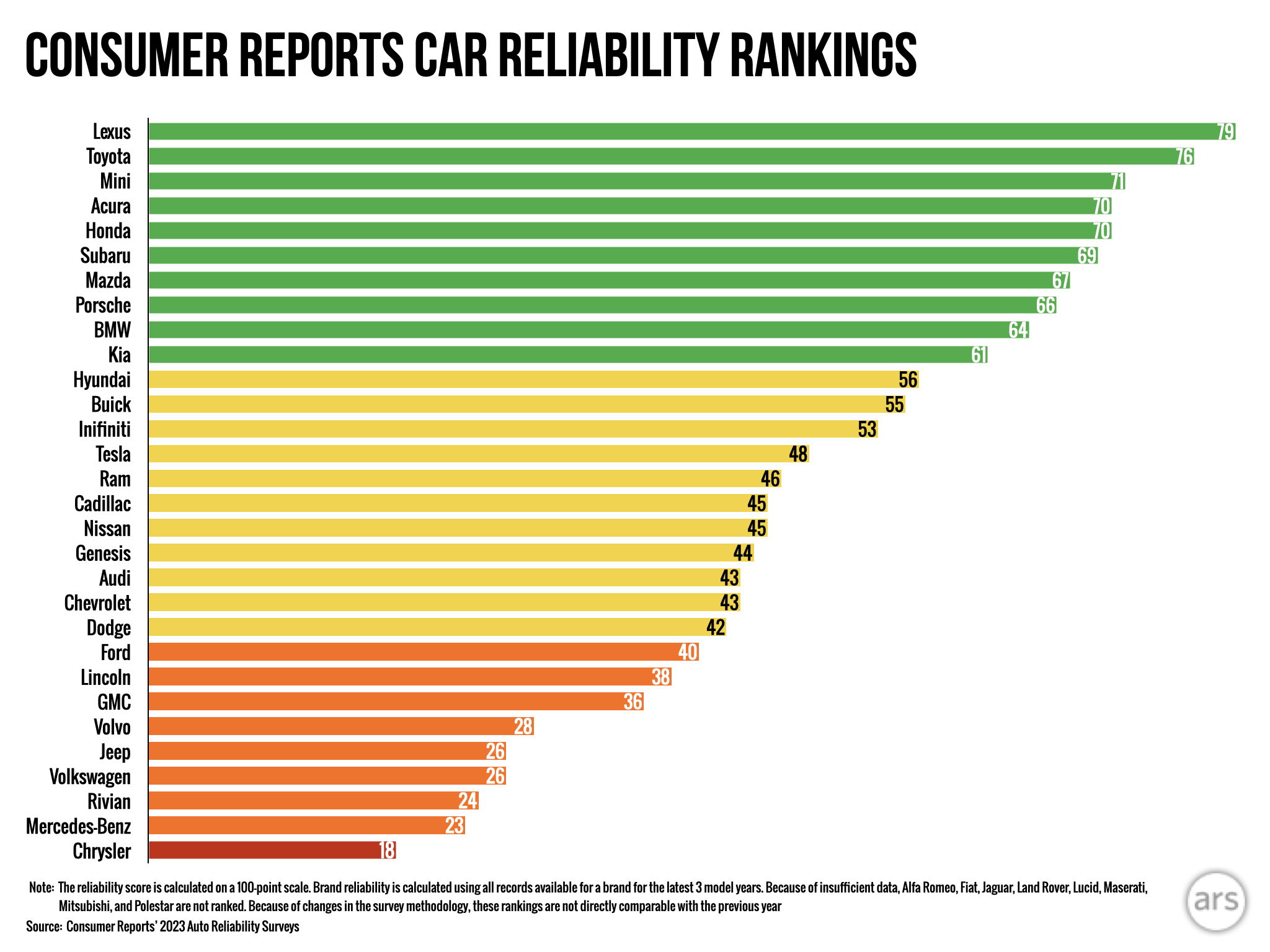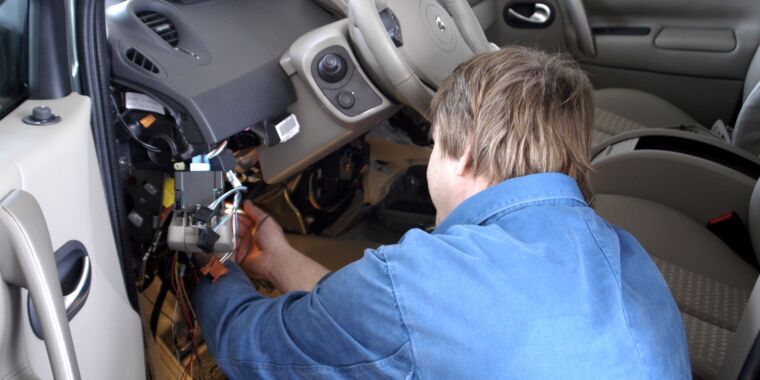- cross-posted to:
- hackernews@derp.foo
- cross-posted to:
- hackernews@derp.foo
It does not help that many new vehicles are built like shit and have complexity for the sake of complexity. Electronic door latches, pop-out door handles, having everything controlled via a clunky, outdated, atrocious GUI, etc etc. These problems are not unique to EV’s but a lot of EV’s are going to have them just because they are brand new vehicles.
The pop-put door handles thing gets me. Like why do I need to push one end of the handle in, then pull it the rest of the way out on the opposite end? It’s so backwards and convoluted.
Just give me a damn handle I pull out to open the damn door. Why is it so hard?
Flush door handles improve aerodynamics by reducing drag.
That’s true, but also dumb at the same time.
The benefit of reduced drag applies regardless of mode of propulsion.
So really, it’s complexity for complexity sake.
not really, because gas engines are so inefficient outside of their ideal RPM range that a little extra drag is barely noticeable.
Hence why they have transmissions that ensure they’re in a favourable RPM range at all times.
deleted by creator
deleted by creator
It’s just more pronounced in EVs right now because there’s been a huge rush to build EVs and a lot of manufacturers are in their first or second year of offering them. Tesla fares relatively well because they’ve pumped out millions of cars for several years and they focus only on EVs. Meanwhile the EV shitboxes being rushed out by Ford and Chrysler are… shitboxes.
The brand graph is useless here because many of these brands make gas and EV cars. I want to know how the Nissan Leaf fares, for example. They’ve been making it for years. Has it reached the same reliability as other Nissan cars?

As a Subaru driver, nice.
I’m a happy Toyota owner as well.
Same. Owned a Volkswagen previously and seeing the ratings difference makes me glad I changed. I was also affected by the diesel emissions scandal at VW. So, that was fun.
My mom had an Audi Q5 (basically a dolled up Volkswagen Toureg) that thing was such a POS. First there was a piston issue that required warranty replacement. Then it started burning oil, and I legit question if they even actually did the piston replacement. It burned a quart every week, but by then, the warranty had expired, so she had to deal with just adding a quart every week. Then it started misfiring, had to change like 5 things out before we got it to stop. She traded it in shortly after, and bought a Toyota instead. I’d been trying to talk her into Toyota when she bought the Audi, but she wanted the fancy German car. Ended up learning the hard way why those things suck. I feel for whoever ended up buying that POS used.
Same here.
Though I wish they were more focused on full EV, rather than the hybrid models (and not even PHEV)
That Toyota 1 year service with warranty is absolutely insane. Will be my next car because of that. £250 for yearly warranty on top of £200+ servicing isn’t great.
I am interested in the differentiation between Ford/Lincoln, GMC/Chevrolet/Cadillac/Buick, and Dodge/Ram/Chrysler, given that each of those groupings is the same manufacturer. And in GM’s case especially they have multiple vehicles under all three marquees that are the same damn car underneath with different badges and trim colors.
Not surprised to see Chrysler at the bottom, though.
What a pile of crap the U.S. auto manufacturers are. They purposefully build cars that break to increase revenue.
It is wrong to see that as a “US car manufacturers” problem. That mistakenly implies that other corporations would not behave this way or that this is anomalous behavior. This is how monopolies behave and it is the end state of any insufficiently regulated market.
Probably down to factory quality control and parts sourcing. Sure most of the parts are coming out of China. But, companies can get better or worse quality parts for more or less money. And once those parts are put in a car, you can have differing levels (read: costs) of the work being double checked.
Clearly, all those brand new Mercedes-Benz drivers are regretting not opting for the used 2008 Hyundai Santa Fe they could have had. Live and learn…
I’ve been in a few newer A class vehicles. My god. It’s like being the the back of a fiat panda ride quality wise. The amount of issues about the screens dying (Speedo, oil, everything and MOT failure) on 2 year old cars costing £700+ for whole unit replacements is insane.
Expect Hyundai/Kia trend downward for the coming years as the used market gets filled with Theta engines. Bummer since the Gamma was solid.
How’s the Kappa? Asking because I have an Ioniq Hybrid
No clue.
On my phone screen, it looked like Lotus was at the top and that didn’t seem right.
With the image compression in the thumbnail, it looked like Lada to me which had me doubly confused.
Glad to see Chrysler down at the bottom where they belong. My MIL’s old 200 needed a new timing belt/chain at 60k miles before it was eventually totalled out by another Stellantis product (old man backing out of his driveway into traffic in a Jeep).
I have a Mini EV… it’s been awesome. The only downside is the range is only realistically around 100mi but it’s good for most of the driving I do. Longer trips we take me wife’s car.
Honda would be higher if it weren’t for the Ridgeline.
I ❤️🔥 my Element though.
I ❤️🔥 my Element though.
I’m hoping to EVify mine. Unless Honda makes an electric one, which case they’d have my money in an instant, I just want to keep this handy compact mofo going forever.
Used to work on the line at a Honda plant building Accords and Acuras. What makes me wary of Honda cars is the fact that something like 70% of the workforce there were temps.
They have this ridiculous system, where they hire everyone as temps, and then use a lottery to bring temps into a full time position. Except that means some temps will work there for over a decade… still as temps. I talked with these guys, they exist. decade of work as temp. no healthcare, no pension, no retirement, no sick days, no nothing. miss 3 days in that decade? you’re fired.
So despite their reputation, I still put them behind Toyota, just because of that. who knows? the seatbelt you trust with your life might be installed wrong and cross threaded and just pop right out during that crash. all because they had a temp do it their first day on the line.
Japanese and German cars are very reliable, surprise, surprise.
Actually it’s looking like German cars are extremely bimodal.
Mercedes is 2nd from the bottom though.
Probably because they use french Renault engines. Slightly joking aside, Merc have been poor for a while. The S class is still the top tier passenger car.
How are mini that high up? It makes no sense. The BMW minis (everything from the last 20 years) are notoriously unreliable. The old ones aren’t great either but they aren’t stand out bad for the time. Cool little cars, but complete shit mechanically.
Mazda here, not a single problem in 9 years… but boy do I want that ex90 when it comes out 😓
I thought Nissan would be higher.
Nissans have been garbage since their CVT transition
Nissan only exists to give people with no money and bad credit an opportunity to buy a new car.
Of which they promptly destroy in creative ways
Kinda surprising, given that the boxer engines tend to start having serious problems at a fairly young age (…which is due to some inherent problems with boxer engine designs and the difficulty in making them sufficiently rigid). So I guess once you switch to an electric motor, Subarus suddenly have improved long-term reliability.
Subaru boxer engines are very reliable, they are just a pain to work on. The main issues Subie’s have is computer issues in warm climates.
Pre 2005 this statement would get you brigaded with head gasket issues, but yeah haven’t heard of those being a regular issue in a while.
Yeah, the head gasket issues were annoying in the early 2000s.
Oil burning is the only real issue’s they have these days. At least for Subaru.
Subaru fixed headgaskets with the new FA and FB series engines. Oil burning is typically consistent so just know how often you need to top it up if it’s a problem, or just get early oil changes. Otherwise they’re very reliable, just hard to work on.
And it’s really only the internal engine work that’s tough without pulling it. Everything else is actually pretty straightforward imo as a shade-tree mechanic
Two of the larger EV companies are new and I think both have quality control issues. I suspect that is probably the bulk of the gap. Im willing to bet that Hyundai Ioniq 5 has far fewer reliability problems than a Rivian.
Also, every Chevy Bolt ever built had a recall a couple years ago. That dragged that car’s reliability score through the mud and wouldn’t surprise me if it had an impact here too.
Hyundai as a whole probably have less issues than most. That 7 year warranty is something they don’t want to be back at the shop for.
deleted by creator
I guess once you boil it down to brass tax the extra 4 year warranty only costs around 1,500. That’s to us so the cost to manufacturers is tiny.
Here is an alternative Piped link(s):
https://piped.video/juNqfxhirBM
Piped is a privacy-respecting open-source alternative frontend to YouTube.
I’m open-source; check me out at GitHub.
deleted by creator
The same Consumer Reports that got sued for overstating the rollover risk of a popular SUV?
I’ll take their opinions on EV’s with a grain of salt.
Gotta love how they don’t state what the most reliable EV is, even in the Consumer Reports original article. I guess you have to pay for that info.
I think we all know what the most unreliable ones are, however
Ok even if the statistic isn’t wildly misleading. It’s not such a bad thing. How long have we been doing gas cars? How long have we been doing ev’s? How does the scale of the two match up.
Tons of resources have gone into the reliability of gas cars. EV’s do not have the same amount of time and resources pooled to it. It’s not a fatal flaw of the concept.
The internal combustion engine has been innovated and improved over a 100+ years. We’ve had plenty of time to experiment with changes and make it incredibly efficient while also addressing reliability issues caused by the engine itself. Not to mention, reliability issues are the sort of thing you find over long term use of a product, and we’re only just getting to the point where EVs have been around for long enough.
What do you mean it’s not such a bad thing? This sounds like the “it’s good for bitcoin” era of fanboyism. Shit doesn’t work and consumers are eating the costs
This is the best summary I could come up with:
CR is known for buying cars for its own test fleet, but for its annual auto reliability survey, the organization cast a wider net.
Hybrids have 19 potential trouble areas—all the above minus the charging problem—and EVs have just 12, since they go without things like internal combustion engines, fueling systems, or transmissions.
And as our data has consistently shown, reliability-minded consumers would be best served by forgoing brand new vehicles in their first model year," said Jake Fisher, senior director of auto testing at CR.
Tesla, despite a legion of horror stories, finds itself very middle of the pack in terms of overall reliability, and in general it builds dependable EV powertrains—less so bodywork, paint/trim, and climate systems.
In general, the Asian OEMs dominate the upper end of the reliability chart, although Mini, Porsche, and BMW also made the top 10.
As noted, Tesla placed pretty solidly mid-pack, along with other domestic brands like Buick, Ram, Cadillac, Chevrolet, and Dodge.
The original article contains 896 words, the summary contains 161 words. Saved 82%. I’m a bot and I’m open source!
In general, the Asian OEMs dominate the upper end of the reliability chart
Not surprising at all. If you’re buying from Western manufacturers then you are getting ripped off.
Not only EV’s, hybrid cars too!
Well that makes sense since hybrid cards have all the guts of EVs AND gas cars. More things that can break.
EVs alone have far fewer parts than can break than gas cars, and there are no explosions taking place inside EVs, so you might think they’d be simpler and more reliable.
Just the idea to have to replace a 12k $$ battery pack sends shivers down my spine. I will have to pass on that for now. + the trend with these cars being spy computers on wheels doesn’t make it a desirable vehicle for me.
Most major EVs these days have a battery management system built in to keep the battery at the temperature they like to be held at - the Nissan Leaf being the most notable exception, and yes that one does get pretty bad.
Keep in mind that these have a lot less moving parts. You don’t have a belt system with an alternator, water pump, A/C compressor (that exists but just plugs into the battery), starter motor, etc. And ICE vehicles aren’t immune to expensive repairs if the engine or transmission blows.
And at least a battery generally degrades over time rather than just going kaput all at once. If after 15 or so years my range degrades to the point where I get about half of what it was new (probably a huge exaggeration of degradation in a car with a battery management system) that’s still 125 miles. Which you get every day by plugging the car in at home. My baby will be in high school by then, she can drive the Bolt.
The tracking shit fucking sucks (I found the way to turn it off) but it’s not inherent to EVs at all.
deleted by creator
I wonder how much money it takes to rebuild a blown engine in a new BMW 3-Series nowadays?
Edit: so I went and had a brief look in Google. It looks like they run between $6000 and $12000 depending on how powerful the engine is. So for a base model it would indeed be somewhat cheaper.
The battery is the biggest issue for me. I will not replace my entire car because they won’t let us replace the battery.
The cars need to be repairable.
That’s not a real concern. The chances of that happening are very close to zero.
I disagree. The amount of articles regarding the subject is substantial. And the battery is lithium, so the battery will degrade. Repairability is a buying point for me.
The battery is warrantied to 100 or 150,000 miles depending on where you live. The number of people who have ever had to replace their batteries is very very small. You’re more likely to have to replace your entire engine and transmission on an ICE car. Degradation is not a serious concern with modern evs.
https://electrek.co/2023/04/25/tesla-update-battery-degradation/
deleted by creator
It’s beautiful













